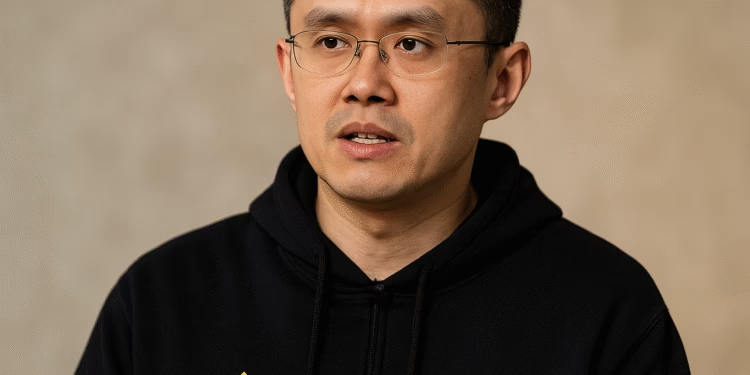Binance co-founder Changpeng Zhao has firmly denied claims by Kyrgyzstan’s president that he proposed establishing a private crypto bank in the Central Asian nation.
President Sadyr Japarov told local media that Zhao had suggested creating Bereket Bank with crypto capabilities during a May visit, but the former Binance CEO called the assertion “wrong” and said he has no interest in running a banking operation.
CZ Rejects Kyrgyzstan Crypto Bank Claim as “Incorrect”
Addressing the Kyrgyzstan crypto bank claim directly on X (formerly Twitter), CZ clarified that he never proposed building a bank in Kyrgyzstan, calling the circulating story “not quite FUD level, but still wrong.”
“This isn’t correct. Not quite 4 FUD level, but still wrong. I never proposed creating a bank myself,” CZ posted on X. “While I support banks working with crypto generally, I have no interest in running one. I don’t recognize the name mentioned below. It’s not something I proposed.”
CZ’s comments make it clear that while he supports traditional banks embracing digital assets, he distances himself from any operational or founding role. This marks a significant rebuttal to the Kyrgyzstan crypto bank claim that President Japarov asserted publicly.
In his interview with Kabar News, President Japarov claimed that the Binance founder rejected the idea of a state-owned crypto bank but agreed to establish a private one instead — which allegedly led to the creation of Bereket Bank.
Japarov stated, “We agreed to open a private bank after CZ declined the idea of a state-owned one.” His remarks fueled the now-viral Kyrgyzstan crypto bank claim, prompting confusion among investors and blockchain enthusiasts across the region.
However, industry analysts suggest there may have been a miscommunication between the Kyrgyz government and Zhao’s advisory team.
“It’s possible that discussions around private sector involvement in digital banking were misconstrued as direct participation,” said Alex Bornyakov, Deputy Minister of Digital Transformation of Ukraine, in an independent comment on global crypto policy coordination.
CZ’s Ongoing Advisory Role in Kyrgyzstan
Despite refuting the Kyrgyzstan crypto bank claim, CZ confirmed his ongoing advisory relationship with the Kyrgyz government. In April, he signed a memorandum of understanding (MoU) with the nation’s Foreign Investment Agency to guide blockchain and cryptocurrency policy frameworks.
Since then, CZ has been involved in multiple digital initiatives, including the development of a national stablecoin pegged 1:1 to the Kyrgyzstani som. This stablecoin, launched in October, operates on the BNB Chain and includes Binance’s native token, BNB, as part of Kyrgyzstan’s potential crypto reserves.
Additionally, under CZ’s advisory oversight, Binance Academy has begun integrating blockchain education into 10 leading Kyrgyz universities — a move praised by local officials as a major step toward digital literacy.
“We’re creating a foundation for a regulated, innovation-friendly crypto environment,” said Almaz Baketaev, Chairman of the Kyrgyz National Bank. “Collaboration with experts like CZ helps us balance opportunity with oversight.”
Crypto Community Reacts to Kyrgyzstan Crypto Bank Claim
The Kyrgyzstan crypto bank claim quickly spread across social platforms, drawing divided reactions. Some viewed Japarov’s statements as an overreach, while others speculated about deeper strategic motives behind the government’s narrative.
Market watchers say CZ’s immediate clarification helped maintain transparency amid growing regulatory scrutiny in the global crypto scene. His prompt denial also reinforces Binance’s cautious approach following his recent leadership transition and legal settlements in the United States.
“CZ’s quick response shows he’s learned from past communication pitfalls,” noted financial analyst Noelle Acheson. “By addressing the Kyrgyzstan crypto bank claim publicly and directly, he controlled the narrative before it spun further out of hand.”
In conclusion, the Kyrgyzstan crypto bank claim underscores how swiftly speculation can escalate in the digital finance space. While President Japarov maintains his version of the story, CZ’s categorical denial — backed by verifiable statements — suggests a misunderstanding rather than malfeasance.
Still, his advisory role in Kyrgyzstan’s crypto evolution remains intact, with several projects continuing to align with the country’s ambitions to become a Central Asian crypto hub.
As the story unfolds, one thing is clear — the Kyrgyzstan crypto bank claim may have sparked confusion, but it has also drawn global attention to Kyrgyzstan’s growing role in shaping crypto policy in the region.










